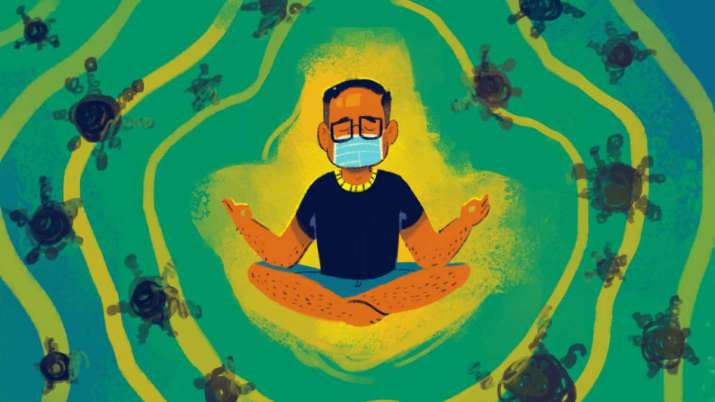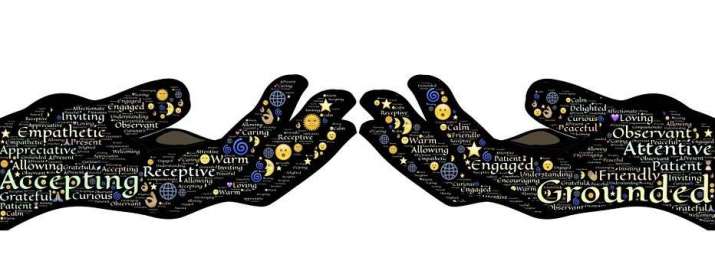
This is your inner prime minister speaking. After in-depth consultation with my trusted advisors, I want to address you with regard to the current health crisis: the pandemic spread of the anxietatem virus. Thank you for listening, and thank you for voting for me and the values our party stands for: Consciousness, Calm, Compassion, Curiosity, Clarity, Contentment, Creativity, Connectedness, Confidence, and Cheerfulness. As you know, the 10-C Party has been successful in containing similar outbreaks in the past and we are confident that we will, with your cooperation, do so again.
It is important to recognize the urgency of the situation. We are seeing the effects on the stock market, and outbreaks of panic-driven behavior have led to empty shop shelves and the disruption of civil order and peace.
Early detection of the anxietatem virus is of the essence and it is easy to self-diagnose, without any special kit or experience. All you need is awareness, which should be in plentiful supply under the current administration. The most common physical symptoms are: tight jaw, clenched stomach, hunched shoulders, clammy hands, and a general feeling of jitteriness, going hand in hand with elevated heartbeat and blood pressure. Among the mental manifestations is repetitive, alarmist thinking that tends to spin out of control and can lead to depression. Infected people can be easily identified by their behavior: compulsive buying of pasta and toilet rolls, restlessness, erratic decision-making, and obsessive social media activity, spreading messages of doom and gloom.
Our scientists think it may be helpful for you to have some information about the nature and behavior of the virus. It is present in all human beings and can lay dormant for some time. Some people have developed a high degree of immunity through the systematic cultivation of awareness antibodies. Denial can be mistaken for immunity—it suppresses the virus for a limited period of time, only for it to erupt later with greater force.
The anxietatem virus seems to have formed a highly successful alliance with the novel coronavirus. Information about the coronavirus enters the host through news and social media outlets and activates the fight, flight, freeze, or flock parts of the brain, which are the oldest, survival-linked parts of the organism. The amygdala fires messages of danger to related brain networks, adrenalin is released, and the victim starts thinking in anxious ways. Typical forms of mental activity involve imagining worst-case scenarios, shortness of supplies, and death. The immediate fatality rate of the illness is actually negligible, but long-term effects are likely, as the prolonged presence of adrenalin undermines the immune system and effects cardiovascular health. The apparent aim of the virus is to overturn the host’s elected government and take over by saturating the system with trembling, jelly-like, or rigidifying fear, blind resentment, paranoia, blame, and the urge to join group trends: a form of flocking. Make no mistake about the severity of the situation: the virus is highly infectious. It has the insidious ability to masquerade as ordinary problem-solving. A conversation may start harmlessly enough and before you know it, you have succumbed to the virus.

The government has put together a list of recommendations based on our 10 C-values. We hope that this will help you not just to survive but to thrive in these extraordinary times.
1. Be conscious and mindful of the first signs of the virus. The sooner you spot the physical tension, obsessive thinking, and urge to join collective panic behavior, the higher your chances of recovery. When you notice thoughts accompanied by a sinking feeling, attend to the sinking feeling first. Feel the physical sensations and breathe into them, embrace them with kindly awareness. Contrary to lifelong beliefs, anxious thinking does not help, but exacerbates the spread of the disease. Focus on present-moment sensory experiences, such as the sensation of the water and the scent of soap when you wash your hands.
2. Be calm. Yoga, tai-chi, dance, and other forms of movement stimulate the soothing system of your organism, as does sitting meditation and even just regularly taking some conscious, long, deep breaths. Slow down and do one thing at a time.
3. Be compassionate with yourself and others—it can be debilitating to be in the grip of the virus. Coping with the radical changes in lifestyle and loss of income connected with the coronavirus is not easy. Remind yourself of the natural human inclination toward caring. The virus shrivels in an atmosphere of kindness and smiling works wonders.
4. Be curious and enter into a friendly conversation with the virus. Find out its true, underlying intention, which is to keep you alive and safe. Anxietatem is not used to being listened to in this respectful way and will sometimes spontaneously mutate into a more benign form. It can even turn into an ally in the pursuit of safety and happiness.
5. Be clear about the dangers of feeding anxiety and allowing it to roam unchecked. It is trying to get you to share stories in which it is embedded. Curtail its multiplication by resisting this lure. Also, be clear about who you want in charge—anxietatem or the 10-C Party and its prime minister. Remember, you are not your anxious thoughts. Ultimately, you are not your wise thoughts either, but something altogether more mysterious and wonderful.
6. Be content. Coronavirus containment strategies involve self-isolation and curtailing social interaction. This is an opportunity to let go of the stressful striving and craving that are a breeding ground for the disease. Accept the limitations, relax into a simpler life of being rather than doing. Savor simple pleasures, such as your breakfast when you don’t have to rush to work.
7. Be creative. If you are self-isolating, reframe the situation into one that emphasizes opportunities for self-expression. It will give you a healthy sense of agency. Try writing about your symptoms of worry—this can be an excellent way of un-blending from it and keeping the 10-C government in charge.
8. Stay connected with your fellow human beings, but beware of contagion. Talking about your anxiety rather than from it is usually an effective way of disabling it. Share your success stories. We strongly recommend you give yourself regular breaks from your smartphone and social media, useful as they are for staying in touch with your community. This allows you to connect with yourself and your own resourcefulness, and in particular with me, your calm inner prime minister, who has your very best interests at heart.
9. Be confident and trust these awareness- and compassion-based methods for containing the spread of the virus. Stay rooted, grounded, and connected with your deeper wisdom. This will allow you to use your thinking faculties in the most effective way and make clear decisions.
10. Be cheerful. Humor and laughter are as infectious as worry and anxiety, and an excellent antidote.
Thank you for your attention. For now, I will leave you with the words of environmental and forest biologist Robin Wall Kimmerer: “I choose joy over despair. Not because I have my head in the sand but because joy is what the Earth gives me daily and I wish to return the gift.”
See more
Living Mindfulness
Holy Isle Centre For World Peace And Health














